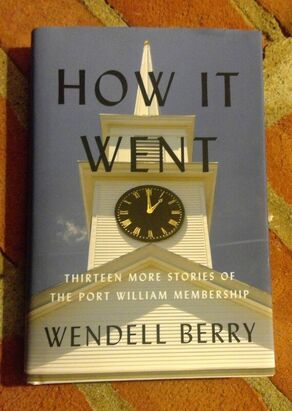 Driving down the road. Putting wet laundry in the dryer. Picking up a garden trowel. The quiet moment before falling asleep. A memory slips into your mind—their familiar whistle, particular look or smell, a phrase spoken…you remember and for a moment you re-member. The Port William Membership…if you don’t know what I’m referring to, it’s time to be introduced to Wendell Berry’s fictional town in Kentucky, its landscape and people. How It Went: Thirteen More Stories of the Port William Membership is his latest (and hopefully not last) book. I bought it for myself for Christmas and quickly read it, but like each of his Port William novels and short stories, they stay with me long after. Berry has a knack for describing the lived experience of the land and its people. Even if their particularities are not your particularities, you find yourself woven into their human experience. Stories of small town & farm-life, a barber and his shop, being a child or a parent during a world at war in the 1940s…they pull you in and draw you like a threaded needle into the fabric of your own life. With an ease that may surprise, you open your own memory box containing the people and places that have made you and many times, held you together. This particular book centers on an old man, a writer, looking back (like Berry himself). “Memories of times and places he had forgotten came back to him, reached him at last as if they had been on their way for a long time. He realized how fully and permanently mere glances, touches, passing words, from all his life far back into childhood, had taken place in his heart…” (p. 76). Andy Catlett remembers those no longer living and “yet by their absence his old companions have in a way come closer to him than they were when they were alive. They seem to involve themselves intimately in his life as he goes on living it” (p. 131). He sounds a lot like Saint John Chrysostom in the 4th century: “Those whom we love and lose are no longer where they were before. They are now wherever we are.” There are expressions of wit and wisdom that you have inherited. There are people whose presence, whether still with you in body or not, continue to bring comfort, encouragement, or perhaps curiosity! Pause for a moment:
___________________________ Just now as I finished writing, my son opened a can of sparkling water and the sound of his pouring it over ice took me back to childhood. I’m in 4th grade, pouring a cold glass bottle of Pepsi over ice and running it out to my mom who is push-mowing the front yard. I knew she loved the frothy fizz and wanted her to enjoy it that hot day. Although little fizz was left by the time she stopped and knelt down to drink it, I remember her look of appreciation, her joy in being remembered. To Get Started with Port William, look for these books: Jayber Crow Andy Catlett: Early Travels Hannah Coulter Nathan Coulter A Place in Time: Twenty Stories of the Port William Membership How It Went: Thirteen More Stories of the Port William Membership Kasey Hitt is a co-founder and instructor for Wisdom Tree Collective. She’s been a spiritual director since 2003 and has been reading Wendell Berry novels and poetry for just as long.
You can also find this blog and others from the Membership of Wisdom Tree Collective here. I couldn’t go to sleep. Spending time in a crowded hospital with a dear friend who was dying left me restless and lying awake looking for God in the dark and finding nothing. It was the proverbial last straw. Too much. “What the hell?!...Does God even exist?!” I bitterly thought in the emptiness. The absurdity of being a spiritual director seemed to mock me in that moment. Every image of God I ever held did nothing to comfort me and the absence of images and comfort left me in a place of nihilistic rage and deep sadness. Even though I had read John of the Cross and Julian of Norwich by her hospital bed, recalling conversations we had enjoyed over the years about their (and our) experiences of love in the darkness, here I was struggling in my own dark night. “What a waste of my life! What a charade!” I thought as I recalled my life of being devoted to God and tending to the spiritual life, both mine and others, only to stare into the void of meaninglessness (and not for the first time). Furrowed brow, eyes squeezed shut, the rest of my body now as tense as my face, silently shouting—"Where is God in this chaos?” “Why even ask? Life is showing me there really is no God at all.” After a while, somehow, something small slipped in through the tightness and whispered, “God IS Chaos.” Before I could think, my brow and eyes started softening. My body noticed the truth before my brain could think about refuting what had just been spoken to me in the dark. Then an image appeared in my mind’s eye—Kali. I couldn't remember much about her, only that she's the Hindu goddess of chaos and destruction leading to life. Images of her can be quite disturbing (especially for those of us Westerners who don't know the symbolism) and here she was showing up in the stillness of night! Later I would read that in Hinduism, she is the ultimate manifestation of Shakti, the primordial energy, the mother of all (watch this video for more). Kali’s dark skin stands for this chaotic, life-birthing energy.  "Hearing ‘God IS Chaos’ and remembering the Hindu goddess, Kali…there was something strangely settling in that, and I was able to fall asleep,” I later texted a friend, a nurse experiencing burnout in a crowded hospital (she went on to write a piece of prose for her doctoral class assignment based on our text thread). __________ The next morning, I walked outside in my pajamas. The stifling heat, sticky humidity, and earsplitting cicadas continued the conversation— I was surrounded by the sound and sensations of chaos. I forced myself to sit in the discomfort. From that place I wondered if I had written anything down from the Icon-Writing Retreat my dear friend and I had attended together a couple of months earlier. I went inside, grabbed my journal, then returned to the front porch to find the dates of that weekend retreat. __________ In the first place, I had no time to go on that retreat. Life had been exhausting and the thought of painting anything in that state added to my overwhelm. In the second place, I wanted to spend time with my dear friend, knowing that stage 4 cancer was eventually going to rob us of time (by the way, Kali's name means both "darkness" and " force or fullness of time"). So I picked her up on a Friday morning in May and went. _________ There it was, May 13th-15th, along with a short entry for each day (the last one being, "I am so glad I went."). I was grateful that I had written down a few things, even though they had been forgotten in the rush of life’s challenges. I recalled how my friend and I sat side-by-side looking at the blank wood that our icons would be painted on and while she felt excitement, I felt dread. How was I going to do this?! The instructor told us to fill our brushes with paint and then said, “Relax, because the first stroke when it comes to painting an icon is called The Chaos Stroke!” Immediately I softened and a hint of excitement even found its way inside my weary head. The Chaos Stroke is named so because it represents the primordial energy at the beginning of Creation found in the first chapter of Genesis in the Hebrew Bible. Our spontaneous swirls and waves echoed the Spirit (or Wind or Breath) of God, moving over the surface of the deep, dark waters. And like the Genesis account, step by step, day by day, things started appearing where before there was nothing but potential in the eye of the Beholder. From the chaos within me, from the chaotic swirls on my wooden panel, emerged a rendering of Rublev’s Trinity from the 15th century! 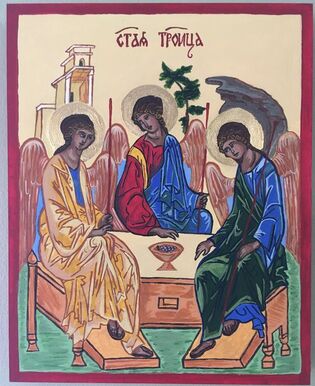 My finished icon of Rublev's Trinity My finished icon of Rublev's Trinity I smiled sitting on the porch, in awe of the synchronicities…chaos, Kali, cicadas, a journal entry about the Chaos Stroke from an icon retreat attended with this friend whose impending death had ushered in another layer of chaos... Nothing had changed. It still felt awful to know my friend was going to die (and she did, less than 24 hours later). And the things that were a mess in my life, were still a mess. Nothing had changed this, and yet… Being open to “God Is Chaos” had strangely allowed comfort and brought the awareness that God was also “With Me in Chaos.” The latter recalls the message gifted us through the person of Jesus the Christ, who was called Emmanuel, God-with-us. Light began shining in my darkness once more. Holding the paradox of "God Is Chaos" and "God With Us in Chaos," I remembered the expression that emerged on the face of the center figure, the Christ, in my friend’s painting of the Holy Trinity—we laughed and called him the “Mischievous Jesus.” He knew something we did not...yet. Even now, words fail to describe how, in darkness and in light, I keep being beckoned into the at-times-difficult, divine dance that Rublev painted years ago, his brush beginning with Chaos. For some of us, Christmas is not experienced as "The Most Wonderful Time of the Year." For all who find themselves in this place, my husband, Russ, and I have offered The Longest Night of the Year Service on or around the Winter Solstice. A friend suggested it to us and after the first gathering in a small, country church over a decade ago, we knew it was something we wanted to continue. The service offers a safe space to acknowledge mixed feelings surrounding the holidays, to join together in lament and longing, and to simply step away from the rush of the season and breathe. Usually Russ offers only instrumental music during the short, 30 minute service but last year we offered the service via Zoom and he created a video with his only song with lyrics, "Some of Us," on his album, The Longest Night. Click on it below, listen and watch. Perhaps there's an image or lyric that connects with your own lament and longing, something that speaks to your soul. As to this year, we are offering the service online once again knowing more people can participate this way. I invite you to join me and a handful of others from Wisdom Tree Collective and Friday Morning Centering Prayer as we allow instrumental music, art from local/regional artists, laments and longings from Scripture, and Creation's own rhythm to companion us in the dark. Tuesday, December 21st 7:30-8:00pm CT Email me for the Zoom link. 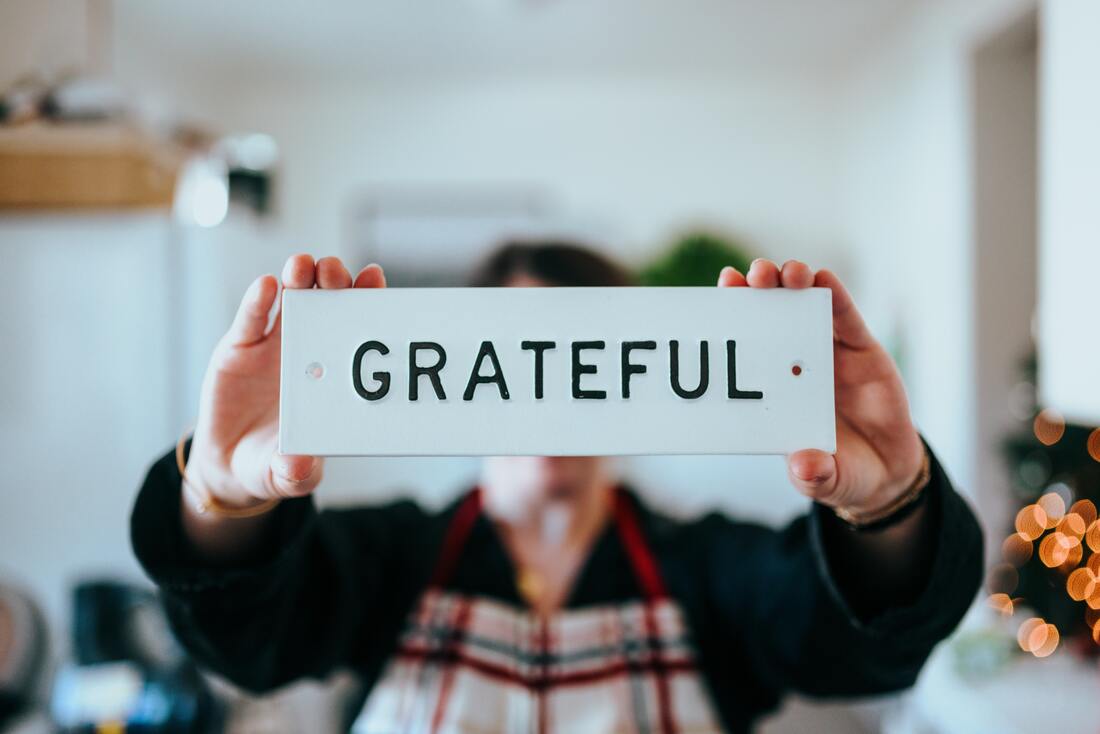 Photo by Nathan Dumlao on Unsplash Two people in my life are facing a terminal illness. And here’s what else they have in common: gratitude. Every time I talk to them, whether a simple conversation or in spiritual direction, I am amazed at the depth of their gratefulness. Their faces light up. It is like their diagnoses gave them new eyes to see life. And they are overwhelmed by the beauty right in front of them. Even more so, they are overwhelmed by the peace of God inside of them. The windows of their souls reflect it in such delightful ways. “Every day I wake up so happy!” one exclaimed to me (without a single relationship or situation changing in their life). How is this possible? Much of it is pure gift. Grace. And some of it, I am sure, is because both have done inner work in the years leading up to this moment. They learned how to listen deeply to God and how to listen deeply to others. They entered into meditation and mindfulness. They learned to play and be playful. They sought out spiritual direction and a precious few others to accompany them along their inner journey. Now their outer journey reflects what they cultivated within. Awe. Humor. Peace. Kindness. Joy. (Just to name a few) I am honored to be a witness. They are teaching me a lot. One of their gifts is reflected in the Sufi poet, Rumi's words, “I saw grief drinking a cup of sorrow and said to it, ‘Tastes sweet does it not?’ Grief confessed, ‘You’ve caught me and ruined my business. How can I sell sorrow when you know it’s a blessing?’” If you have no idea how sorrow can be a blessing and if you do not wake up happy, maybe it is time for an inner journey of your own. There is so much to be grateful for in this life. Some Words for Those Who Won’t Listen (and for Healthcare Workers Who Are Exhausted From Shouting)8/18/2021
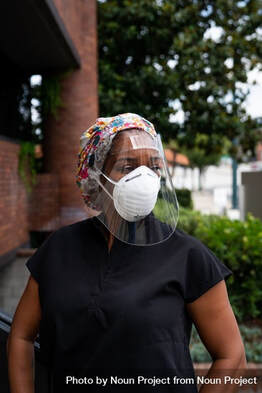 Portrait of thoughtful nurse outside in PPE looking away from camera by Noun Project from NounProject.com Portrait of thoughtful nurse outside in PPE looking away from camera by Noun Project from NounProject.com “Wake up!” they shout. “Pay attention! Turn around!” These are words of prophets. And I have heard from three of them this week alone. With the shouting and weeping of Isaiah and Jeremiah, health care workers are sounding the alarm. Are we listening? They have the “inside scoop” of “reality as it is” rather than what we would like reality to be. COVID is not over. Social issues of the day and people’s selfish lack of response to them fired up Old Testament prophets. But their audience was a “stiff-necked people,” not listening to those who God was speaking through. These nurses and chaplain came to Spiritual Direction fired up about people’s lack of response to this social issue of our day. They are watching a preventable illness kill people of all ages while most seem to go on as though nothing is happening (or simply have decided to due to pandemic fatigue). The fruit of “false prophets” (like a pastor in my town who is preaching against and even punishing parishioners for wearing masks or the government and local leaders playing politics) is fear, division, isolation, hate, and death. They may speak the “right words” even use religious-sounding language, but “you’ll know them by their fruit” taught Jesus. The fruit of these health care prophets is lived-out compassion and the saving of lives. A vaccinated chaplain holds the hands of unvaccinated patients on the COVID floor of the hospital, putting her own and her young family’s health at risk to offer comfort. A nurse recovering from her own break-through case of COVID feels like she’s at the breaking point as she continues to tend to so many patients. A neonatal nurse watches as her pediatric hospital begins to fill and warns that the most vulnerable are suffering due to a view of freedom divorced from the common good. These health care workers are fired up with anger that shouts, “Something must change!” They are fired up…and they are exhausted. “Last year we were everyone’s heroes,” one told me, “this year we are ignored and at times even hated. I don’t understand. We’re seeing so much death and no one is listening to us, no one seems to care about us. Any cards of encouragement sitting around are from last year.” “I don’t know how long I can do this,” another said. It is time to stop dissociating. The path of and toward Life can be hard (& long) sometimes. But as my good friend, Linda says, “We do not do things because they are easy, we do them because they are important.” Listen to what the health care workers are saying is important. Here’s one right here in Tennessee. ____________________________ Now if you are a health care or front-line worker, an adult or child surrounded by people who refuse to heed the prophetic voices of our time, but prefer to “listen to what their itching ears want to hear” (see II Timothy 4:3), I want to offer some observations from a Spiritual Direction session this week. With her permission, allow these insights from a Florida chaplain of a big hospital to speak to you. First, let's begin with some Lectio Divina. Mark 4:35-41 35 On that day, when evening had come, he said to them, “Let us go across to the other side.” 36 And leaving the crowd behind, they took him with them in the boat, just as he was. Other boats were with him. 37 A great windstorm arose, and the waves beat into the boat, so that the boat was already being swamped. 38 But he was in the stern, asleep on the cushion; and they woke him up and said to him, “Teacher, do you not care that we are drowning?” 39 He woke up and rebuked the wind, and said to the sea, “Peace! Be still!” Then the wind ceased, and there was a dead calm. 40 He said to them, “Why are you afraid? Have you still no faith?” 41 And they were filled with great awe and said to one another, “Who then is this, that even the wind and the sea obey him? After listening to the story read to her three times, the chaplain spent time with two phrases she was drawn to: “On that day” in verse 1 and “the cushion” in verse 38. These details held precious wisdom for a way through this pandemic storm. Here is what she discovered:
 Spiritual practices, like meditation and even church-going, can become spiritual bypass—ways of bypassing reality both outside and inside of us, dissociating from wounds within and without, ignoring the healing work that needs to be done in our inner and outer world. But spiritual practices can also be vehicles for transformation of both ourselves and our world. How?—by giving us new ways of seeing and being (which is the whole point of authentic spiritual practice). Let’s take a look at a few practices... Conscious Breathing: With as little as 10 slow, complete exhales and 10 full, relaxed inhales, we can calm the fight, flight, freeze survival impulse, allowing us to move from a reactive, closed off, defensive place to a receptive, open, deeper place. Centering Prayer: Through daily practice of 20 minutes of silent surrendering to God’s presence & action, we let go of our ego-drivenness and receive inner healing of compulsions and soul wounds. Not only does this bring personal freedom but it releases us from projecting our compulsions and wounds on others and passing them down to our children. Lectio Divina: Spiritual reading allows a word or phrase in a small portion of inspired text, whether sacred Scriptures like the Psalms or a poem, to speak to us. Rather than bringing what we already know or studying it, we allow the text to study us! As we bring our story, our lives, to it, we humbly listen for the wisdom and guidance being offered (which may be encouragement to see a counselor or write a letter to your senator!). Awareness Examen: Looking over our lives at the end of the day through the eyes of God helps us become aware of God’s life-giving presence and action (and the times throughout the day when we were unaware or resistant). The patterns of what is life-giving and life-draining help us discern who we are and what we are to offer this world. Silent Retreats: Extended time in silence and solitude creates space for our souls to rest and play which opens us to better hear the “still, small voice” which may be drowned out by the external noise of daily life or the internal noise of comparing ourselves to others. There are so many practices I could list here but the point isn’t the practice itself, it’s the “fruit.” Seated meditation may not fit you. You may desire some kind of moving meditation, like dance or qigong. Or you may prefer to spend time in nature or doing art. What practices have you found that cultivate love in you? What helps you have eyes to see and tend to the suffering both inside yourself and in others? Which ways of wisdom help you discern what is yours to offer this world (not out of compulsion but compassion)? A Spiritual Director can companion you on this journey of discovery of spiritual practices. But remember, it’s not necessarily the practices, it’s the humans who are transformed by these practices, that this world needs. What do spiritual practices like Centering Prayer offer a hurting world?—YOU! 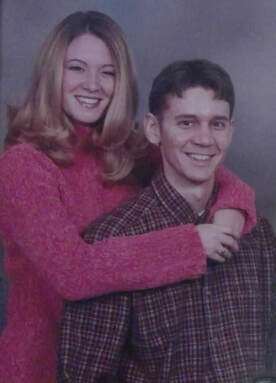 Kasey & Russ in early 2001. Kasey & Russ in early 2001. Trembling and bewildered, the women went out and fled from the tomb. They said nothing to anyone, because they were afraid. Mark 16:8 (NIV) Sometimes our reaction to resurrection isn’t joy. Sometimes it’s trembling and bewilderment (or as the NRSV translation says “terror and amazement”). This Easter, my family of four paused at this ending of the book of Mark before continuing on with the two endings that were added later on. My teen daughter jokingly calls the latter the “fan fiction endings” (alternate endings or additional info added by those who love the story rather than the original author). She is a reader of fan fiction when it comes to her favorite novels. Clearly the women's fear and silence was not the end of the story given how it unfolded in the other Gospels and in the book of Acts, but the earliest manuscripts stop at verse 8. And it got us wondering how many times in our own stories has God presented us with resurrection and we’ve been too scared out of our minds to accept it (let alone tell anyone!). This might be resurrection in the form of a new dream, calling, or relationship arising just when we thought all hope was dead and gone. Maybe this has happened to you (or is happening to you) and instead of joy, your first response is trembling, bewilderment, and keeping it to yourself. Why? Why might terror and amazement be our first reaction to the reality of resurrection? It doesn’t fit our storyline. We’re not expecting it. The women were expecting to see Jesus’ body, that’s what they were prepared for. Their biggest challenge was how they would roll the stone away, that’s the story they were prepared for. They were utterly unprepared for this. Years ago, my husband had just broken off an engagement. He told God he was ready to be a lifelong bachelor, then less than two months later, I came along…terror and amazement. We don’t want to let go of our old storyline. If we let go of what is familiar (even if it’s painful), what might that mean? What might others think if something is voiced that is out-of-the-norm, completely other than what is expected? They were just ordinary women going about their plan to anoint their loved one’s dead body. Nothing out-of-the-ordinary. Now they are told to be evangelists! Women sharing the Good News with men—of the risen Christ—not so easy, definitely tremble-worthy. In Russ’ hidden handbook of dating, two months was not enough time in between relationships. What might others think? Could he let go of what others (and even a part of himself) thought? The new storyline seems too good to be true. Who wouldn’t want to hear that their loved one has been raised from the dead?! Sometimes when something is beyond our own imagining, it triggers all of our insecurities and fears. Given women’s role in society, perhaps the women that early morning felt especially vulnerable in sharing such news. Would they be believed and if not, what then? Could they bear being mocked and belittled? Entering into another relationship for Russ, meant entering into another possibility of exhausting dysfunction, hurt, and rejection. Staying to himself seemed easier, but after our first conversation, he could not resist the feeling of hope for a healthy relationship. He had to decide if stepping out of hiding was worth the risk and ridicule. He decided to take the risk that comes with resurrection. After learning I had just had my wisdom teeth out, he walked up to me after a church service (he played in the worship band and I was the youth pastor) and asked how I felt after the surgery. Awkward? Yes. Did it trigger not only his, but all of my own insecurities? Yes. But, we will have been married for twenty years this October. As I write this, I’m staring into the face of another resurrection. It has come while I have not yet totally released my grief and attachments to the old, dying storyline (what, how & who I had planned on being part of the unfolding of a dream I had pictured over fifteen years ago). Much like Russ experienced twenty-one years ago, God has raised up a new dream before I have felt ready, causing much trembling and bewilderment! And like the women that morning, I have been afraid. I have needed time to ponder whether or not the eyes of my heart have been deceiving me. And I have needed to further loosen my grasp on the old while becoming aware of what has been triggered in me so as to open my hands and give my heart to the new. As the Spirit of God gives me courage, I share the good news of this new dream with others. And I imagine it will spread soon enough (as good news eventually does!). _________________________________ When resurrection happens may your eyes be open to see it. And may the terror and amazement lead not to shame but to solitude with the God who raises the dead and to community with spiritual companions who can give you courage. May you trust that you will not remain afraid forever, but step boldly, no matter how clumsily, into the truth revealed by the resurrected Christ. I don't have much to say today. Although I have much on my mind. It's the one anniversary of the destructive tornados in my city of Mt. Juliet, TN, and surrounding area, followed by news of the pandemic days later. Maybe you are just as astonished and speechless as me when it comes to how much the world has changed in one year. I read Ecclesiastes with different eyes, I can tell you that! 3 For everything there is a season
A look back at an animation my daughter began creating on the day of the tornados to help her work through her own feelings and to find a way to help others. Sometimes what helps our own soul, helps other souls, too. Advent is a time of gestation. Much like the discomfort and anticipation of pregnancy, we wait on the arrival of what is deeply hoped for and anticipated.
A few weeks ago I was in a sensory-deprivation tank floating on 1500 pounds of salt. It's supposed to be (and usually is) relaxing but that day I kept squirming around...like a baby in the womb. Last year I went to a Benedictine Sister for both Spiritual Direction and healing touch at a monastery where I would be facilitating a retreat the following day. During the time of laying on of hands, when she got to my abdomen she said, "We are in the womb of God who is birthing us. Birth pains are difficult, but we WILL be born." I teared up as I heard these words of deep hope, because I had been restless then, too. In liminal space, I felt the strain of being "betwixt and between," especially in relationship with my own religious institution where the leadership continued pulling back from engaging contemplative practice with each passing year. Knowing the transformative power and wholeness found in contemplation and action, I continued to hope. What this hope looked like in regard to my faith community, I found myself full of questions with no easy or sure answers. Her words of hope spoke to my soul but did not take away the struggle. Contrary to idealistic views of hope, theologian Jurgen Moltmann (known as the theologian of hope), writes in Experiences of God, "...whenever faith develops into hope it does not make people serene and placid; it makes them restless. It does not make them patient; it makes them impatient. Instead of being reconciled to existing reality they begin to suffer from it and to resist it." The Sister's words of hope gave me deep permission to accept the struggle and discomfort as part of the process of rebirth. When I realized that it was not wrong, but natural, to be squirming in the float tank, I found myself smiling with a newfound acceptance. Instead of trying to be still, I playfully allowed my arms and legs to stretch and move however they wanted. It felt freeing. If I could allow this restlessness in the float tank, how about other in places of my life? After all, Saint Paul reminded the people in Athens of the perennial truth of their own Greek poets when he quoted, "For in him we live and move and have our being." Sometimes we rest, sometimes we walk, sometimes we wriggle in the womb of God. _____________________
Anxiety. Anger. Heaviness. Headache. Nausea. Nerve-pain. Tension. Tears.
My 14-year-old woke up way too early this morning and as we met in the hallway both of us bleary-eyed, she said, “Ugh, I’m feeling everyone’s collective stuff.” “I hear you,” I replied. This is normal. We are all interconnected so you’re not alone today if you are feeling more than your normal share in this liminal space. Jesus felt his people’s collective pain. He shares in our suffering. However, at this point, unlike Jesus, we often go searching outside ourselves for a remedy that can only come from a deeper place within. Understandably, we want a quick fix. We want to feel better and we want others to feel better. So we are apt to compulsively scan the horizons of social media, news, books (even the most holy ones!), and other people (even the most holy ones!) looking for “good news” or at least a reminder that we are not the only burden-bearers. But no amount of memes, quotes, or conversations can offer what that pit in our stomach is crying out for. It knows something, that discomfort, that pain. It has stories to share (for our bodies hold memory). You actually don’t need any new insights, you need to trust the ones you already have! So what do you already have? What do you know in your depths? I trust you know something to be true in your bones. What is it? Here are some additional ways to listen to the wisdom within (God’s own Spirit dwelling within your own being, your own story, your own body).
By the way, when I asked my daughter what she knew to be true in her bones, her worried brow immediately softened as perennial wisdom rushed from the depths to the surface. She sang, "Don't worry about a thing. 'Cause every little thing gonna be alright." Bob Marley, Julian of Norwich, Saint Paul, and Jesus, would all agree. |
AuthorKasey is a scarf, ball and club juggling spiritual director just outside of Nashville, TN. Play helps her Type-A, Enneagram 1 personality relax, creating space for poetry and other words to emerge. She also likes playing with theological ideas like perichoresis, and all the ways we're invited into this Triune dance. Archives
January 2024
Categories
All
|
By clicking “Sign up for E-News” I consent to the collection and secure storage of this data as described in the Privacy Policy. The information provided on this form will be used to provide me with updates and marketing. I understand that I may modify or delete my data at any time.
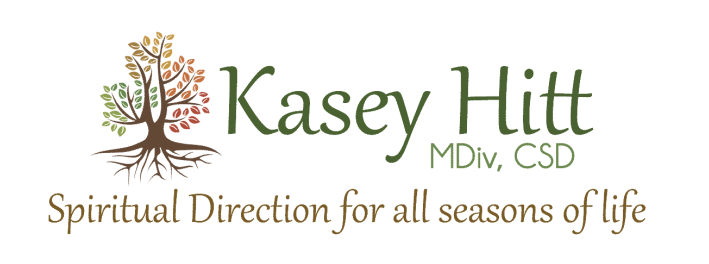
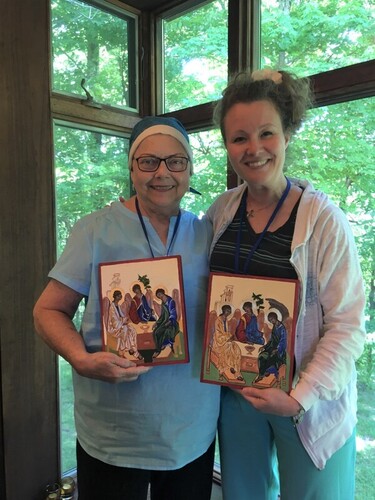
 RSS Feed
RSS Feed

